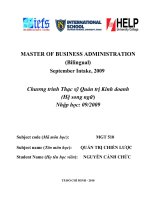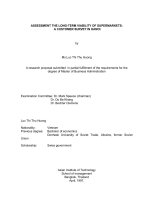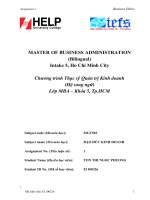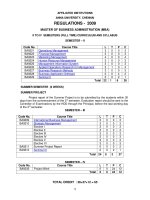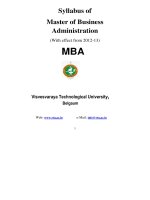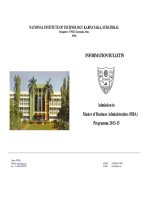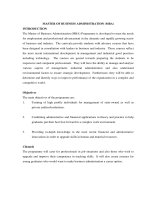EXECUTIVE MASTER OF BUSINESS ADMINISTRATION (EMBA)
Bạn đang xem bản rút gọn của tài liệu. Xem và tải ngay bản đầy đủ của tài liệu tại đây (1021.49 KB, 49 trang )
Institute of Finance
and Administration
United Business Institutes
Brussels, Belgium
PROGRAM HANDBOOK
&
COURSE MANUAL
EXECUTIVE MASTER OF BUSINESS
ADMINISTRATION (EMBA)
in collaboration with
INSTITUTE OF FINANCE AND ADMINISTRATION, VIETNAM
APPLICATION REQUIREMENT
REQUIREMENTS
1. Entry Requirements (Yêu cầu đầu vào)
Eligibility for the Executive MBA Program shall be based on the following:
Điều kiện tham dự khóa học cho các học viên khóa EMBA như sau:
Bachelor degree from a recognized university or post graduate diploma holders/ Đã có
bằng Cử nhân hoặc bằng sau Đại học của trường đại học được công nhận.
Diploma holders above 28 years of age with minimum 3-5 years working experience at
supervisory level/ Đã có bằng Cử nhân cao đẳng, trên 28 tuổi và có tối thiểu 3 năm
kinh nghiệm làm việc ở vị trí quản lý
Mature students above 30 years of age with a minimum of 5 years working experience/
Nếu đang là sinh viên thì phải trên 30 tuổi và tối thiểu 5 năm kinh nghiệm làm việc ở vị
trí quản lý.
Prospective students who do not fulfill the above requirements may be accepted into the
program on a case-by-case basis/ Học viên không đáp ứng được những yêu cầu trên sẽ
được xem xét theo từng trường hợp cụ thể.
2. Application Procedure/Thủ tục đăng ký
All students wishing to apply must thoroughly complete an Application for Admissions
form, failing which it will be returned. The following documents are to accompany the
Application for Admissions:
Học viên bắt buộc phải cung cấp đầy đủ thông tin trong Hồ sơ xin nhập học. Trong trường
hợp hồ sơ không hợp lệ sẽ bị gửi trả lại. Hồ sơ bao gồm:
•
UBI Application Form/Đơn xin nhập học EMBA của UBI
•
Curriculum Vitae/Resume/Sơ yếu lí lịch
•
Certified true copies (commissioner of oaths /IFA Brainpower who must sight originals)
of award scrolls & transcripts of previous qualifications from ‘O’ Level equivalent
onwards/ Bản sao các bằng cấp, giải thưởng và bảng điểm có chứng thực (Đơn vị được
ủy quyền / Viện IFA Brainpower chịu trách nhiệm đối chiếu với bản chính)
•
Current and/or former employer and/or referee testimonials/Thư giới thiệu của cơng ty
đã / đang làm
•
04 photos/04 tấm ảnh 4x6
•
Relevant fees according to the latest fees schedule/Đóng các khoản phí liên quan theo
mức học phí mới nhất
3. Deadline for registration/Thời gian đăng ký
Thời gian nộp hồ sơ xét tuyển từ ngày 20/07/2010 đến hết ngày 21/08/2010
Deadline for registration: from 20th July, 2010 to 21st August, 2010.
4. Tuition Fees/học phí
Program/Chương trình
MBA
One time
Đóng 1 lần
Three times
Đóng 3 lần
The first
Lần 1
The second
Lần 2
The third
Lần 3
5,500
5,900
2,500
2,000
1,400
United Business Institutes (UBI), Belgium
Executive Master of Business Administration (EMBA) Program Handbook
United Business Institutes
Brussels, Belgium
Executive Master of Business Administration
EMBA Program Handbook & Course Manual
in collaboration with
Institute of Finance and Administration, VietNam
1
United Business Institutes (UBI), Belgium
Executive Master of Business Administration (EMBA) Program Handbook
TABLE OF CONTENTS
A Word from the Dean ......................................................................................................... 3
PART I 1.0
2.0
PROGRAM OUTLINE.................................................................................... 4
Introduction – IFA Brainpower .................................................................................. 4
1.1
About United Business Institutes (UBI) .......................................................... 4
The UBI Executive Master of Business Administration (Executive MBA) .................. 6
2.1
Learning Objectives ....................................................................................... 6
2.2
Program Structure ......................................................................................... 6
2.3
Learning Outcomes ....................................................................................... 7
2.4
Assessment Methods .................................................................................... 7
2.5
Mode of Study: Teaching/Learning Strategy .................................................. 7
Table 2.5a: Contact/Study Hours per Module ............................................... 7
2.6
Entry Requirements ....................................................................................... 8
2.6.1 Application Procedure......................................................................... 8
2.7
Validating and Awarding Authority ................................................................. 8
2.8
Program Interruption...................................................................................... 8
2.8.1 Withdrawal.......................................................................................... 8
2.8.2 Leave of Absence............................................................................... 8
2.9
Credit Exemption Policy................................................................................. 9
2.10 Grading Structure ........................................................................................ 10
Table 2.10a: Grading Scheme .................................................................... 10
2.11 CGPA Calculation........................................................................................ 10
2.12 Graduation Requirements............................................................................ 10
2.13 Graduation with Honours (Executive MBA) .................................................. 11
2.14 Cheating and Plagiarism.............................................................................. 11
2.15 Benefits of the UBI Executive MBA in collaboration with IFA Brainpower..... 11
PART II – UBI Executive MBA MODULE SYLLABUS ........................................................ 13
MGT 501: CORPORATE FINANCE .................................................................................. 13
MGT 502: MANAGEMENT ACCOUNTING....................................................................... 13
MGT 503: KNOWLEDGE MANAGEMENT ....................................................................... 14
MGT 504: E-COMMERCE ................................................................................................ 15
MGT 505: HUMAN RESOURCE MANAGEMENT ............................................................ 16
MGT 506: STRATEGIC MANAGEMENT .......................................................................... 17
MGT 507: COMPANY LAW .............................................................................................. 17
MGT 508: STRATEGIC MARKETING MANAGEMENT .................................................... 18
MGT 509: ENTREPRENEURSHIP ................................................................................... 19
MGT 51O: RESEARCH METHODOLOGIES ..................................................................... 20
2
United Business Institutes (UBI), Belgium
Executive Master of Business Administration (EMBA) Program Handbook
A Word from the Dean
Welcome, Dear Visitor and Prospective Student!
Thank you for your interest in UBI and for your visit on
our site. Let us wish you a most stimulating "discovery
tour". UBI is Belgium's leading, fastest growing
international Business School. Our programs will not
only prepare you to manage in the broadest sense, but
will also help you learn from cultural differences, through
group work with fellow students from a growing number
of countries (over 72 to date!). We call this "Action
Learning"!
Our curriculum is constantly reviewed by our Faculty and
Advisory Council, which is your guarantee that our
programs integrate the most practical, up-to-date
material. You can be sure that all you will be learning at
UBI can be put to use immediately and effectively in the
widest possible range of business environments.
Another vital aspect of our programs is the networking and confrontation of experiences that
happen between students. Our alumni (former students) keep telling us how much they
benefited, personally and professionally, from this interaction with their classmates, and
how they consider it to have been as important as the knowledge acquired on our
programs.
If you need additional information, please contact us via e-mail, telephone, fax or regular
mail. We will make sure that you hear from us at the soonest.
Yours truly
F.A. d’ANETHAN
Dean
United Business Institutes
3
United Business Institutes (UBI), Belgium
Executive Master of Business Administration (EMBA) Program Handbook
PART I 1.0
PROGRAM OUTLINE
Introduction – IFA Brainpower
IFA Brainpower is dedicated to improving the way companies and individuals learn, use,
and master technology through educational solutions that empower customers with choice,
allowing them to determine when, where, and how they want their business and ICT
education programs to be designed and delivered. To this end, we are committed to
continuously harness the power of cutting-edge digital technologies for the dissemination of
knowledge.
Armed with this simple mission, we strive to provide media rich e-learning and e-knowledge
solutions that help organizations retain knowledge, improve quality, become more efficient
and cost-effective - using current and cutting edge digital technologies.
IFA Brainpower is the first e-learning service provider offering the latest state-of-art
education for business and ICT education programmes, corporate training courses and
education-related services. Online training has become one of the important components in
today’s education. Mastering technology skills, especially the Internet and web-based
applications, is an ultimate requirement in delivering online classes thus giving teachers
with no option but to acquire these appropriate skills. The Internet’s impact on the
developments and delivery education as well as training program is real. By combining
innovative technology with World-Class Universities, IFA Brainpower delivers anytime,
anywhere learning. It offers both companies and individuals a high value, quality and
effective online training solution.
Over 100 courses are available, ranging from certificate, diploma, degree in business and
information communication technology as well as language courses. IFA Brainpower
epitomises the value of continuous lifelong learning and has provided students from all over
the world with access to internationally renowned courses without having to leave their
countries and without affecting their work schedules. This flexible virtual learning vehicle is
well-supported by comprehensive online learning tools. Students can access course
materials conveniently through a Web browser, engage in synchronous chats with their
course facilitators, post questions in the discussion rooms, make payments online, and reap
the benefits of collaborative learning through online discussions with facilitators and coursemates in other parts of the world. In addition, it also provides services like monitoring and
feedback of students' progress and performance, private e-mail facilities as well as roundthe-clock customer service.
1.1
About United Business Institutes (UBI)
Location:
United Business Institutes is based in Brussels, Belgium. It is housed in a cozy mansion
dating back to the 19th century, with full modern conveniences. Easy access, right in
downtown Brussels, close to the Porte de Namur/Naamsepoort. (Metro, bus, and train)
Recognition
United Business Institutes is facilitating the transfer of business academic credits, and is
especially encouraging international student exchange among top Institutions worldwide.
Students from accredited and recognized Colleges, Business Schools and Universities are
thus welcome to join without interrupting progress towards a degree. UBI students come
from more than 72 countries. Among the top schools in the world that recognizes U.B.I
qualifications are:
4
United Business Institutes (UBI), Belgium
Executive Master of Business Administration (EMBA) Program Handbook
London University
Mercer University
AGSIM, Thunderbird
SDA Bocconi
Webster University
Tilburg University
American University
Clark University
University of Wales
University of Miami
University of Westminster
(UK),
(Atlanta, Georgia, USA),
(Glendale, Arizona, USA),
(Milan, Italy),
(Geneva, Switzerland),
(The Netherlands),
(Paris, France),
(MA, USA),
(UK),
(Florida, USA),
(UK), and many more.
Besides recognition by the above international universities,
•
UBI’s Bachelor degree programs have been designed to meet the European Bologna
Process expectations and standards.
•
Its on-campus Bachelor of Arts in Business Studies is validated by the University of
Wales, UK.
Rankings
UBI and its business programs at various levels has been ranked consistently in the top 20
positions by various organizations and is based on a combination of criteria such as;
student/alumni satisfaction, academic feedback, international appeal and prestige in
community, full time starting salaries, GMAT scores, work experience, male/female mix and
“quality of life” at school.
•
Ranked 9th in Top 10 European Business Schools by the International Education
Commission (I.E.C) Belgium, 2003 based on />
•
Ranked 16th in the Top 20 European MBA by of the Netherlands.
The combined recognition from the prestigious universities listed and the consistent
rankings makes the UBI Executive MBA a truly internationally recognized one that is of a
high calibre.
Advisory Council
The role of the Advisory Council is to give regular feedback on present Management
techniques and Business trends. The Members of the Council all take a leading part in
today's international business environment, and devote both time and counseling to UBI
students and Faculty, be it for curriculum requirements or in other instances. Keeping
Education as close as possible to the Business World is our common concern. This council
is led by the President, Claire de HEDERVARY, (B.A. Philosophy, Louvain University;
graduate work Harvard University: Ph.D.(abd) in Economics and International Law,
Columbia University.) He is also a member of The John F. Kennedy School of Government
Women's Leadership Board of Harvard University - Formerly Director in the Political Affairs
Department of the UNITED NATIONS (New York) and Belgian Delegate to the UNITED
NATIONS.
5
United Business Institutes (UBI), Belgium
Executive Master of Business Administration (EMBA) Program Handbook
Faculty
Although most of the professors are active in the Business World and doing Research, a
great deal of their time is devoted to teaching, counselling, and exchanging ideas with
students inside and outside of the classroom. Their attitude is much closer to coaching than
it is to just teaching. The quality of teaching and contact with the students are also
monitored by means of a Teaching Evaluation form that is handed to every student at the
end of the semester or term.
2.0
The UBI Executive Master of Business Administration (Executive MBA)
2.1
Learning Objectives
UBI offers an Executive Master of Business Administration degree preparing students for
broader management responsibilities and for more specific assignments in business. Its
goals are:
i)
To develop understanding of the socio-cultural, economic and political environments
in order to reach a professional perspective beyond present responsibilities.
ii)
To foster the ability to identify problems, obtain relevant data, design and evaluate
alternative approaches, and implement the best choice.
iii)
To set up a basis for dealing effectively with others; to become aware of recent
developments in behavioral sciences.
iv)
To obtain an interdisciplinary understanding of fundamental concepts and principles
from the various business disciplines.
v)
To encourage students to think broadly and to bridge all gaps between the theories
and the actual practice of effective Management.
2.2
Program Structure
The Executive Master of Business Administration (Executive MBA) degree program
prepares individuals for careers in management. It is conducted and offered by the United
Business Institutes, Belgium. More specifically, its aim is to provide an opportunity for men
and women to develop knowledge, abilities, attitudes, and understanding that will constitute
a foundation for growth into competent business management professionals, qualifying
graduates to seek employment in major industries including computer-related services,
investment banking/securities and consulting in the areas of marketing, research, analysis,
and/or finance with emphasis on application in today’s fast-changing and ICT
dominated economy. The program shall consist of the following ten (10) modules:
i)
MGT501
Corporate Finance
ii)
MGT502
Management Accounting
iii)
MGT503
Knowledge Management
iv)
MGT504
E-Commerce
v)
MGT505
Human Resource Management
vi)
MGT506
Strategic Management
vii)
MGT507
Company Law
6
United Business Institutes (UBI), Belgium
Executive Master of Business Administration (EMBA) Program Handbook
viii)
MGT508
Strategic Marketing Management
ix)
MGT509
Entrepreneurship
x)
MGT510
Research Methodologies
2.3
Learning Outcomes
At the end of this Executive MBA programme, students in essence will acquire:
i)
A high level of communication and interpersonal skills, the capacity for professional selfdevelopment and be able to effectively respond to changes in the business environment.
ii) The ability to identify and analyse business problems, collect relevant data so that plans
and policies can be formulated, implemented and control in a strategic manner.
2.4
Assessment Methods
The assessment for the UBI Executive MBA program is 100% by coursework for each of
the ten modules described. In general the coursework shall consist of a 3,500 (+/- 10%)
words written assignment which is to be submitted in a professional consultative report
format. Further details of each module assignment will be provided by the module
facilitator.
2.5
Mode of Study: Teaching/Learning Strategy
The program is delivered modularly, i.e. one module over a 6-week period at a time
through distance learning with face-to-face and web-based support. The entire program
can be completed in 15 – 18 months. Contact hours and study hours shall be broken down
as follows:
Table 2.5a:
Contact/Study Hours per Module
Delivery Mode
Face-to-face tutorials with facilitators
Online workshop
Pre-recorded tutorials
Group Presentation in Virtual Classroom
Interactive Self Study
Total Contact / Study Hours
Lectures/self study
12
12
Tutorials
5
8
8
45
In the spirit of blended and flexible e-learning, the onus of study rests with the student but
will be comprehensively supported by:
Electronic resources such as e-library, on-line tutorials and chats
Over 200 audio-visual files on various management titles compiled by IFA Brainpower
Latest Action Learning Seminar series materials by Harvard Business Publishing
Hard and soft copies of course materials, study guides, CD-ROM handouts.
7
United Business Institutes (UBI), Belgium
Executive Master of Business Administration (EMBA) Program Handbook
2.6
Entry Requirements
Eligibility for the Executive MBA Program shall be based on the following:
An undergraduate degree (Bachelor degree) or post graduate diploma holders
Diploma holders above 28 years of age with minimum 3-5 years working experience at
supervisory level.
Mature students above 30 years of age with a minimum of 5 years working experience
Prospective students who do not fulfill the above requirements may be accepted into the
program on a case-by-case basis.
2.6.1
Application Procedure
All students wishing to apply must thoroughly complete an Application for Admissions form,
failing which it will be returned. The following documents are to accompany the Application
for Admissions:
•
•
Curriculum Vitae/Resume
Certified true copies (commissioner of oaths / IFA Brainpower who must sight originals)
of award scrolls & transcripts of previous qualifications from ‘O’ Level equivalent
onwards.
•
•
Current and/or former employer and/or referee testimonials.
Relevant fees according to the latest fees schedule.
2.7
Validating and Awarding Authority
The Executive MBA program will be conducted, validated and awarded based on the
stringent academic standards by UBI Belgium.
2.8
Program Interruption
2.8.1
Withdrawal
Students who wish to withdraw from the program must abide by the following:
i)
Students must complete a Program Withdrawal Form available from the IFA
Brainpower Office.
ii)
Withdrawals will not be processed without written notification described above and
the student(s) will still be liable for any outstanding fees owing.
iii)
iv)
Any fee(s) paid up to the point of withdrawal is not refundable.
Students who wish to re-register later are subject to the new fees schedule and
cannot use any of their fees paid up to the point of withdrawal to offset the program
fees at the point of re-registration.
2.8.2
Leave of Absence
In cases of emergency where students may have to interrupt / postpone their studies,
students must request for a Leave of Absence (LOA). To justify such emergencies, the
following conditions shall apply:
8
United Business Institutes (UBI), Belgium
Executive Master of Business Administration (EMBA) Program Handbook
i)
Medical reasons: The student must provide an original medical certificate from an
authorised clinic stating the reasons and the time the student needs to be away from
his/her studies.
ii)
Work reasons: The student must provide an original letter from his/her immediate
supervisor on company letterhead stating the reasons to support the student’s
application for a LOA.
iii)
The student must submit a written letter accompanied by either documents stated in
either of the case above and stating clearly:
•
•
•
•
iv)
the date of the request
the anticipated date of return
Signing the letter.
The Academic Advisor may then grant the LOA if sufficient reason and evidence is
provided. When a student is granted a LOA consequences may include:
•
•
•
2.9
the reason for the request of the LOA
Receiving a “F” grade for any course not completed at point of LOA approval
Repeating the failed courses upon return
Extending the graduation date.
Credit Exemption Policy
Students who seek exemption for credits obtained in prior study to be recognised or
transferred into the UBI Executive MBA program must fulfil the following criteria:
i)
The course module sought for exemption must not be concurrently completed at
another school / institution with the UBI Executive MBA program enrolment.
ii)
The course descriptions of transferred or exempted coursework must be
substantially (at least two-thirds) the same as the equivalent UBI Executive MBA
course modules which will be verified by UBI’s academic faculty.
iii)
Validation of Credits: Credits will only be accepted for exemption or transfer from
other schools / institutions only upon receipt of official transcripts provided to IFA
Brainpower and forwarded to UBI for processing.
iv)
For any course module exemption sought, students must have received a “B” grade
(GP of 3.00) or better (according to UBI’s grading structure).
v)
Maximum credit exemption / transfer into the UBI Executive MBA programme is 25%
of the course load or two (3) out of ten (10) course modules.
vi)
All credit exemptions / transfers to UBI’s Executive MBA program from other schools
/ institutions must be from courses taken within the past ten (10) years unless a
request for special exemption is made to the Dean.
vii)
Requests for credit exemptions / transfer are normally submitted during the
application and admissions process and must be filed with UBI’s Admissions Office
through IFA Brainpower accompanied by the latest exemption fees schedule.
9
United Business Institutes (UBI), Belgium
Executive Master of Business Administration (EMBA) Program Handbook
2.10 Grading Structure
All modules are graded out of 100% with a minimum of 70% to pass a module. The
academic performance of a student is based on the grades obtained and the accompanying
grade point average as indicated below:
Table 2.10a: Grading Scheme
Marks
(%)
Grade
Grade
Point
(4.0 scale)
97 – 100
A+
4.00
93 – 96
A
4.00
90 - 92
A-
3.66
87 – 89
B+
3.33
83 – 86
B
3.00
80 – 82
B-
2.66
77 – 79
C+
2.33
73 – 76
C
2.00
70 - 72
C-
1.66
67 – 69
D+
1.33
63 - 66
D
1.00
60 - 62
D-
0.66
Description
Status
EXCEPTIONAL: Superior
Performance showing
comprehensive understanding
of subject matter
Pass
GOOD: Above average
performance with knowledge of
subject matter generally
complete
Pass
Pass
Pass
Pass
Pass
Pass
SATISFACTORY: Average
understanding of subject matter
UNSATISFACTORY:
Unsatisfactory performance.
Generally insufficient
preparation for subsequent
matter in the same subject
Pass
Pass
No Credit
Refer Status: Students have to
resubmit their assignments which
will be capped at a “B” Grade
No Credit
FAIL
0 -59
F
0.00
Failure to understand the
subject
Defer: Students will have to register
again for the module with the latest
accompanying fees at the next
offering and submit a new
assignment. (no cap on grades)
Note: Any late submission of assignment will be subjected to a late processing fee.
2.11
CGPA Calculation
Since this is a modular program, there is no sessional GPA only a cumulative one and given
that all modules carry the equal number of contact hours and credits (3), the cumulative
GPA will be calculated based on the following:
Σ of all numeric values of 10 grades obtained
10 modules attempted
2.12
= Cumulative Grade Point
Average (CGPA)
Graduation Requirements
For students to be eligible for graduation, the following shall apply:
10
United Business Institutes (UBI), Belgium
Executive Master of Business Administration (EMBA) Program Handbook
i)
An overall GPA of 3.00 on a 4.00 scale must be maintained throughout the program
and for all ten modules attempted.
ii)
Fulfilment of all financial obligations to IFA Brainpower and UBI.
2.13
Graduation with Honours (Executive MBA)
Candidates for graduation who have demonstrated superior quality work will be recognised
as indicated below.
Recognition
Summa Cum Laude (Highest Honors)
Magna Cum Laude (High Honors)
Cum Laude (Honors)
2.14
GPA
3.85 to 4.00
3.75 to 3.84
3.50 to 3.74
Cheating and Plagiarism
The choice of action taken by the faculty member is guided by the extent to which the
faculty member considers the cheating or plagiarism reflects the student’s lack of
scholarship or lack of academic performance in the course and may include any of:
i)
Review – no action
ii)
Oral reprimand with emphasis on advising to prevent further occurrence
iii)
Requirement that the work be repeated
iv)
Assignment of “Failure” for specific work in question
v)
Assignment of “Failure” for the course as a result of (iv) above.
vi)
Referral to the Dean of the University or Academic Council, as appropriate.
Students accused of cheating or plagiarisms are entitled to and may petition for process by
review of the appropriate forum.
2.15
Benefits of the UBI Executive MBA in collaboration with IFA Brainpower.
The program is conducted by United Business Institutes, Belgium in collaboration with IFA
Brainpower, Vietnam who shall act as an approved recruitment and academic resource
centre in Vietnam. This smart partnership between UBI’s many years of academic
experience and IFA Brainpower’s academic resources and e-learning platform is a marriage
of many mutual benefits that students will enjoy. Among them are:
A highly sought-after degree by business, government and private industries worldwide
who are seeking effective and up to-date professionals and leaders.
Allows students to better understand the most critical asset of an organization - it's
knowledge and data as well as its people.
To distinguish themselves in the job market with the inclusion of Knowledge
Management and Harvard Business Publishing materials that other general MBA
programs do not offer.
11
United Business Institutes (UBI), Belgium
Executive Master of Business Administration (EMBA) Program Handbook
To enhance the student's knowledge base, critical analysis, thinking, and problem
solving skills needed in the real world context.
Using the most current business management technology and academic course
materials available.
~ End of Part I ~
12
United Business Institutes (UBI), Belgium
Executive Master of Business Administration (EMBA) Program Handbook
PART II – UBI Executive MBA MODULE SYLLABUS
MGT 501: CORPORATE FINANCE
Module Description & Learning Objectives
This module is designed to allow students to gain a fundamental and sound understanding of
the primary sources of finance and the workings of the capital market and the implications of
various funding and investment appraisal techniques in managerial decision-making. This will
in turn allow students to demonstrate the various techniques of financial analysis and foreign
exchange management.
Learning Outcomes
Upon successful completion of this module, students will be able to:
Describe both long and short-term sources of finance
Describe the workings of the capital market
Apply utility and portfolio theory and the capital asset pricing model
Recognise and apply financial ratios in credit and risk management
Describe and apply the effects of gearing on the capital structure of companies using
arguments of Modigliani and Miller.
Describe possible conflicts of interests between shareholders and bond holders
Describe how the use of cross-section analysis of accounting data, inter-firm and
inter-industry comparisons and the management of foreign exchange.
Describe the strategic importance of forensic accounting and good corporate
governance.
Reference Text:
Text:
Author:
ISBN:
Publisher:
Modern Corporate Finance
Alan C. Shapiro / Sheldon D. Balbirer
0-13-080098-8
Prentice Hall
MGT 502: MANAGEMENT ACCOUNTING
Module Description & Learning Objectives
This module provides students with the understanding of the nature of cost and its behaviour in
changing circumstances. Students will be able to consider and appreciate the type of costs for
short-term decision-making and prepare budgets for planning and control. They will also be
able to calculate and analyse variances from set standards and understand the major aspects
of working capital management.
Learning Outcomes
Upon successful completion of this module, students will be able to:
Demonstrate the link between cost and financial accounts.
13
United Business Institutes (UBI), Belgium
Executive Master of Business Administration (EMBA) Program Handbook
Analyse data in their various cost classifications and the volume effect on costs.
Describe basic differences between marginal and absorption costing.
Use limiting factors, opportunity costs, sunk and differential costs in short term decisionmaking.
Define budgetary control and its purpose and to construct planning and control budgets.
Explain the purpose of standard costing, calculate and analyze variances for materials,
labour, overheads and sales, and produce operating statements.
Describe the use of IT for costing purposes.
Reference Text:
Text:
Author:
ISBN:
Publisher:
Introduction to Management Accounting, 12th edition
Charles T. Horngreen / Gary L. Sundem / William O. Stratton
0-13-042352-1
Prentice Hall
MGT 503: KNOWLEDGE MANAGEMENT
Module Description & Learning Objectives
This module is designed to allow students to have a basic understanding of the current
state of practice, techniques and technology used by organisations to extract more value
from their knowledge assets. It will outline the difference between data, information,
knowledge and wisdom and its intricate inter-relationships.
Knowledge capture and
creation will be portrayed as a dynamic feedback system in its life-cycle to improve
organisational performance. Techniques of capturing tacit knowledge and a system of
codification will be explored. Systems testing and development will be analysed to align
with techniques used in knowledge transfer and sharing in the e-world. Knowledge
management opportunities through data mining and data warehousing will be explored
together with the mechanics of knowledge management tools and knowledge portals. The
mapping of knowledge assets with knowledge workers, critical to its implementation will be
studied. Ethical and legal issues in this dynamic field of study will be considered together
with what the future holds for this field of study.
Learning Outcomes
Upon successful completion of this module, students will be able to:
Describe the difference, hierarchy and use of data, information, knowledge and wisdom.
Describe the process of learning and the process of enquiry towards attaining
knowledge and wisdom.
Apply the knowledge life-cycle and the process of capturing, creating, storing and
dissemination of knowledge using technology.
Apply knowledge-mapping on workers to align with knowledge needs of an organisation
Use various techniques to capture and codify knowledge.
Use knowledge management tools and knowledge portals in decision-making.
Use discretion in the ethical aspect of applying knowledge management.
Stay vigilant concerning emerging trends in technology and knowledge management.
14
United Business Institutes (UBI), Belgium
Executive Master of Business Administration (EMBA) Program Handbook
Reference Text:
Text:
Author:
ISBN:
Publisher:
Knowledge Management
Elias M. Awad & Hassan M. Ghaziri
0-13-034820-1
Pearson Education
MGT 504: E-COMMERCE
Module Description & Learning Objectives
This module gives a complete introduction to the world of electronic commerce as part of
the bigger notion of electronic business. It will encompass a balanced coverage of technical
and business topics. Differences between traditional and e-commerce will be explored.
The benefits and drawbacks of using e-commerce will be highlighted in conducting the
business. The international nature of e-commerce due to the evolution and growth of the
Internet and the World Wide Web will be studied. Changing economic and other
environmental forces that have stimulated the emergence of e-commerce and how they
continue to influence and shape business transactions will be analysed. A basic
understanding of the technical infrastructure especially in the architecture and language of
networking and its protocols will be included.
Various networking alternatives will be
presented for connecting to the Internet together with their costs and bandwidth tradeoffs.
Learning Outcomes
Upon successful completion of this module, students will be able to:
Describe the comprehensive overview of building and managing an e-commerce site in
particular and an e-business in general.
Describe the decisions involved in bringing business transactions online.
Apply a suitable model for different business circumstances in accepting payment,
deploying marketing strategies, procuring raw materials and other resources as well as
supply chain management.
Uncover and use various Web resources to assist in developing a Web-based
storefront.
Demonstrate basic use of application programming aimed at non-programming
audiences.
Apply the use of electronic mail, internet utility programs to trace, locate and verify
status of Internet host sites.
Demonstrate basic understanding of Telnet and File Transfer protocols.
Understand the history and the use of Web Markup languages including, SGML, HTML,
and XML.
Demonstrate and understanding of the differences between internets, intranets and
extranets and web client and server architecture and explore the cost and bandwidth
trade-offs in its use.
Reference Text:
Text:
Author:
Electronic Commerce, 2nd edition
Elias M. Awad
15
United Business Institutes (UBI), Belgium
Executive Master of Business Administration (EMBA) Program Handbook
ISBN:
Publisher:
0-13-140265-X
Pearson Education
MGT 505: HUMAN RESOURCE MANAGEMENT
Module Description & Learning Objectives
This module allows students to gain an understanding of the dynamic role of human capital
management and development. Human resource policies and practices in contemporary
organisations as a competitive advantage will be covered in understanding their contribution
towards achievement of organizational goals. Major philosophies, policies, procedures and
practices related to the increasing internationalisation of human resource management will be
defined and examined critically. The knowledge of human behaviour in an organizational
context under the influence of environmental factors will be explored in how it should be
applied in analysing, diagnosing and providing solutions to changing managerial situations
and problems.
Learning Outcomes
Upon successful completion of this module, students will be able to:
Explain the nature of the human resource management process is influenced by internal
and external factors.
Identify the needs and methods of organizational change and recognise resistance to
change and methods to overcome them.
Demonstrate an understanding of the purpose, stages, techniques and sources of
information in human resource planning.
Identify the main factors of labour market issues such as supply and demand, job
analysis, training-needs analysis, recruitment techniques, selection and transfer,
termination, turnover, absenteeism.
Explore the growing importance of utilisation of human resources towards efficiency and
productivity and how motivate, organise, and measure performance.
Explain the causes of changing working patterns and forms of employment such as,
shift work, part-time work, flexible working hours, distance working and job sharing.
Explain the importance of a systematic, progressive, transparent and equitable human
resource development policy in an increasingly competitive labour market in connection
with mapping of knowledge workers.
Compare and contrast different employee compensation structures in light of
performance based reward systems.
Understand the increasing strategic role of human resource management in counselling,
public relations and corporate communications towards organisational objectives
Understand the fundamental importance in managing industrial relations.
Reference Text:
Text:
Author:
ISBN:
Publisher:
Human Resource Management, 9th edition
Gary Dessler
0-13-045265-3
Pearson Education
16
United Business Institutes (UBI), Belgium
Executive Master of Business Administration (EMBA) Program Handbook
MGT 506: STRATEGIC MANAGEMENT
Module Description & Learning Objectives
This module allows students to gain a deeper understanding of the strategic management
process. It allows the student to develop and apply concepts and theories that frame
contemporary strategic management and planning. It looks into the need for critical
awareness and analysis using various strategic management portfolio analysis tools.
Traditional strategic models will be criticized for its decreasing validity in light of the
contraction of time in an increasingly turbulent business and management environment
fraught with challenges of globalization, liberalization and technology as drivers of change.
This is intended so that knowledge gained may be transferred to the student’s own work
environment to create the awareness and receptivity to changing trends that affect current
strategic management decisions.
Learning Outcomes
Upon successful completion of this module, students will be able to:
Formulate and structure complex strategic problems and provide reasoned and logical
solutions.
Use the full range of strategic management techniques and concepts.
Understand and demonstrate benefits and limitations of strategic management tools and
frameworks.
Demonstrate the ability to justify choice of strategic alternatives.
Challenge the validity of traditional strategic management models.
Inculcate a sense of open-mindedness and receptivity to new and emerging trends and
therefore changing methods of strategy analysis, formulation, implementation and
control in a constantly turbulent environment.
Reference Text:
Text:
Author:
ISBN:
Publisher:
Strategic Management, 9th edition
Fred R. David
0-13-112372-6
Pearson Education
MGT 507: COMPANY LAW
Module Description & Learning Objectives
This module is designed to provide students an understanding of the principle of of business
and company Law as applied in the Vietnamn context. Students will be exposed to the
introduction of company law, the registration and formation of companies, Memorandum and
Articles of Association, the capital structure requirement of companies, public issuance of
shares, the management and control of companies, the requirement of meetings, the
17
United Business Institutes (UBI), Belgium
Executive Master of Business Administration (EMBA) Program Handbook
enforcement of corporate rights, the reconstruction and arrangement of companies and the
dissolution of companies.
Learning Outcomes
Upon successful completion of this module, students will be able to:
Distinguish three major business entities; sole-proprietorship, partnership and company.
Distinguish the classification of companies such as private limited, public limited, limitations
by shares, guarantee, and foreign companies.
Understand the basic procedures to register and incorporate a company.
Understand the importance and significance, of the Articles and Memorandum of
Association and its effect and alteration.
Understand the law that governs share capital, loan capital, liabilities, floatation exercise,
scriptless and insider trading.
Appreciate the laws governing the appointment, removal, qualification, powers, duties, and
responsibilities of Directors, Company Secretaries and Auditors, the fiduciary duties of
directors and rights of shareholders and protection of minority shareholders.
Understand the importance of meetings and the enforcement of corporate rights.
Understand the types of reconstruction and arrangements; takeovers, merges,
amalgamation and the governing bodies in question and the effects on the creditors,
shareholders and members of the company.
Understand the procedures in different types of dissolutions and winding ups.
The statutes referred will include:
Companies Act, 1965 (Act 125)
Securities Industry Act, 1983
Companies Regulation, 1966
Securities Commission Act, 1993
Companies (Winding Up) Rules, 1972
Reference Text:
Text:
Author:
ISBN:
Publisher:
Company Law
Aiman Nariman Mohd. Sulaiman / Aisah Bidin / Pamela Hanrahan / Ian
Ramsay / Geof Stapledon
981-04-6337-5
CCH Asia Pte. Ltd.
MGT 508: STRATEGIC MARKETING MANAGEMENT
Module Description & Learning Objectives
This module ensures that students are aware of the major aspects of the strategic
marketing management functions. It provides students with the understanding and ability to
analyze and evaluate marketing management issues and how it contributes to corporate
18
United Business Institutes (UBI), Belgium
Executive Master of Business Administration (EMBA) Program Handbook
management. It will introduce students to all stages of the planning process and its
application to the marketing function. Students will be exposed to the use of analytical tools
in the marketing mix for decision-making and planning tailored to specific needs/wants of
identified market segments to achieve strategic objectives. To this end, an understanding
of what constitutes a market segment as well as consumer behavior will also be explored.
This will allow a student a broad understanding of issues concerned with the effective
implementation and control of marketing plans. In light of the pervasiveness of international
marketing efforts, elements involved in and that may influence international marketing
efforts will also be covered. This module will also look into the necessary understanding of
and use of the combination of qualitative and quantitative analysis of marketing situations to
help students develop the power of diagnosis as a concrete basis for marketing decisionmaking.
Learning Outcomes
Upon successful completion of this module, students will be able to:
Conduct a comprehensive analysis of complex marketing situations.
Critically assess both qualitative and quantitative marketing data for decision-making.
Understand the complex nature and intimate inter-play between internal and external
factors influencing marketing functions and activities.
Apply the accumulated marketing knowledge and techniques to advance alternate
solutions for a variety of marketing problems in real-world circumstances.
Formulate marketing plans based on appropriate marketing objectives and strategies
justified by costs and timelines.
Provide appropriate control mechanisms and contingencies to proposed marketing
plans.
Reference Text:
Text:
Author:
ISBN:
Publisher:
Marketing Management, 11th edition
Philip Kotler
0-13-0497150
Pearson Education
MGT 509: ENTREPRENEURSHIP
Module Description & Learning Objectives
This module allows students to understand the process of turning an idea into a business
reality. It will focus on the execution of the entrepreneurial process. Students will learn to
explore ideas and the value of picking a practical winning idea and how to make effective
presentations to capture investor interests. The process will include building partners,
employees and investors and how to manage the growth of the business. Product and
service development through operations and marketing efforts will be examined.
Techniques to manage the budget to allow for this process will be covered as well. This
module will highlight practical applications in the context of today’s dynamic and turbulent
business world.
Focus will be on how new business ideas are developed and
19
United Business Institutes (UBI), Belgium
Executive Master of Business Administration (EMBA) Program Handbook
implemented, stimulated by the opportunities and challenges brought about by
globalization, liberalization and technology. The understanding of the entrepreneurial
process requires a change in paradigm that looks into the changing rules of competition
giving rise to new and contemporary business models. Discussions will include related
ethical, international and legal issues on how to fundamentally start a viable business.
Learning Outcomes
Upon successful completion of this module, students will be able to:
Understand, organize and use elements of an effective business plan.
Incorporate the use of effective format, style for investor presentations.
Recognize for use, the different sources of venture capital and financial assistance
Establishing business goals and objectives to incorporate into the business plan.
Formulate a sales and marketing start up effort.
Establish the variety of different needs of starting up operations.
Consider the environmental forces that influence the launching of the business.
Reference Text:
Text:
Author:
ISBN:
Publisher:
Entrepreneurship
Kuratko and Hodgetts
Southern Western
MGT 51O: RESEARCH METHODOLOGIES
Module Description & Learning Objectives
This module begins with a philosophical approach by revisiting the notion of the process of
learning through enquiry. It will familiarize the student with the variety of research methods
to allow the student to compile a professional consultative report relevant to their work or a
dissertation for the purpose of academic pursuit. Students will learn the concepts and
research terms of social sciences, the fundamentals of data collection, analysis and
measurement. They will also study the different approaches in framing research questions
and design a research study.
Application of theoretical concepts, methodological
perspectives and empirical approaches will also be covered. The overall objective is for
students to conduct valid and independent research, produce and interpret data and make
recommendations for effective organisational change by advancing reasoned and logical
\arguments concretely justified by research findings.
Learning Outcomes
Upon successful completion of this module, students will be able to:
Understand how we think and learn through deduction and induction, lateral thinking,
fuzzy thinking and unbounded systems thinking.
20
United Business Institutes (UBI), Belgium
Executive Master of Business Administration (EMBA) Program Handbook
Build on theories by using variables, hypotheses to challenge the validity of theories.
Use research methodology tools such as methodology diaries to overcome
methodological problems.
Use discretion in balancing the combined use of qualitative and quantitative data under
different circumstances of study and research.
Use different methods for qualitative and quantitative methods of data collection,
sampling and sampling frames, determining population sizes that accurately represent
survey designs and test for its randomness, reliability and validity.
Distinguish common statistical fallacies and their flawed assumptions.
Handle statistical techniques in data analysis and interpretation through the use of
SPSS towards decision making.
Reference Text:
Text:
Author:
ISBN:
Publisher:
Research Methods in Business
Uma Sekaran
John Wileys & Sons
~ End of Part II ~
21
United Business Institutes (UBI), Belgium
Executive Master of Business Administration (EMBA) Program Handbook
United Business Institutes
Brussels, Belgium
Chương trình Thạc sĩ quản trị kinh doanh dành cho người đi
làm
Đề cương chương trình và hướng dẫn đăng ký
in collaboration with
Institute of Finance and Administration, IFA, VietNam
Page 1 of 25
